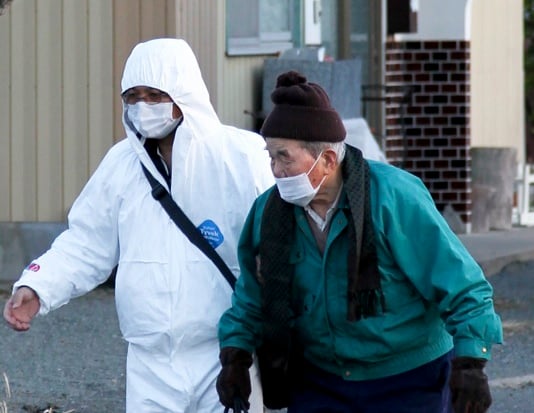Stocks and U.S. futures fell, with the Nikkei 225 index posting its biggest two-day drop since 1987, while commodities slid and Treasuries jumped on concern a nuclear disaster is unfolding in Japan. Bahrain credit risk soared after Saudi troops entered the nation.
The MSCI World Index of stocks fell 2.3 percent, while the Nikkei dropped 10.6 percent to the lowest since April 2009 and Standard & Poor's 500 Index futures tumbled 2.8 percent. The yield on the 10-year Treasury slid 11 basis points to 3.24 percent and the two-year German note yield fell 13 basis points, adding to its longest run of declines since November 2009. The Swiss franc strengthened against its 16 most-traded peers while oil lost 2.6 percent. Credit-default swaps insuring Japanese debt climbed to a record and Bahrain contracts jumped to a 1 1/2-year high.
Tokyo Electric Power Co.'s stricken nuclear power plant was rocked by two explosions today as workers struggled to avert a meltdown that may lead to more radiation leaks in the wake of the March 11 earthquake. Saudi Arabian troops moved into Bahrain as part of a regional force in the first cross-border intervention since popular uprisings swept through parts of the Middle East.
“In addition to the tragic events in Japan, the market had to contend with a potential escalation of the Middle East situation,” Gary Jenkins, head of fixed-income at Evolution Securities Ltd. in London, wrote in a client note. “It would not be a surprise if the significant price moves of the last couple of days did not lead to problems elsewhere in the financial system.”
Meltdown
As reported by
InvestmentNews on Monday, the ongoing problems at the crippled facility in Fukushima have
hammered the prices of nuclear-energy stocks and funds. Conversely, the share prices of alternative energy stocks and exchange traded funds have risen substantially.
Even in the best-case scenario — where Japan manages to avoid a nuclear meltdown, a scenario that seems less likely today — the cost of nuclear power will rise as a result of this incident, experts said.
“It will raise the cost of nuclear energy because any new plants will require an extra layer of security,” said Ivka Kalus-Bystricky, portfolio manager of the Pax World International Fund (PXINX). “That means at the margin, alternative energy becomes more attractive.”
Stocks Flop
The Nikkei 225's one-day drop was the biggest since October 2008. South Korea's Kospi Index sank 2.4 percent, the most in four months, while Taiwan's Taiex Index retreated 3.4 percent, the most since February 2010. Credit-default swaps on Japan's government debt soared 25.8 basis points to a record 122.3, according to CMA.
The Stoxx Europe 600 Index lost 3.3 percent as the VStoxx Index, which gauges the cost of protecting against declines in the region's shares, surged 38 percent. Volkswagen AG and Daimler AG led automakers lower, tumbling 6.5 percent and 5.3 percent respectively. German utilities RWE AG and E.ON AG fell more than 3 percent each after Chancellor Angela Merkel put plans to extend the life of the nation's nuclear plants on hold for three months.
The slide in S&P 500 futures indicated the benchmark gauge for U.S. equities will decline for the fourth time in five days. Reports today may show manufacturing growth in the New York region picked up pace this month and the cost of goods imported into the U.S. rose in February, according to Bloomberg surveys of economists.
30-Year Treasury
The 30-year Treasury bond yield slid 9 basis points to 4.44 percent, with the 10-year yield declining to the lowest since Dec. 10. The Fed will keep its main interest rate in a range of zero to 0.25 percent today, according to all 101 economists surveyed by Bloomberg. The 10-year German bund yield dropped 12 basis points to 3.11 percent, while the yield on the two-year note sank 13 basis points to 1.51 percent.
Belgium said it postponed a sale of six-year bonds because of market volatility caused by the Japan nuclear crisis.
Credit-default swaps on Bahrain jumped 20 basis points to 334, the highest since July 2009, according to CMA. Contracts on Japan soared 26 basis points to a record 122, and Tepco rose 253.5 basis points to an all-time high 402.5, up from 40.5 basis points on March 11. The Bloomberg GCC 200 Index of Persian Gulf shares sank 2.7 percent and Saudi Arabia's Tadawul All Share Index lost 3.6 percent, the biggest slide in almost two weeks.
Oil Tumbles
Brent crude for April settlement fell to $110.72 a barrel as Japanese refinery shutdowns reduce the demand for oil. U.S. gasoline futures fell as much as 4.1 percent to $2.8393 a gallon in New York electronic trading, the biggest intraday drop since Oct. 19, 2010. Natural gas futures rallied for a third day, advancing 1.2 percent on the New York Mercantile Exchange to $3.959 a million British thermal units on expectations Japan will require more gas for power generation after the nuclear disaster.
Copper for delivery in three months fell 2 percent to $9,007 a metric ton on the London Metal Exchange, leading a decline in industrial metals. Silver for immediate delivery retreated 3.5 percent to $34.66 an ounce, dropping for the first time in three days. Platinum, palladium and gold also fell.
Derivatives tied to rates for capesize ships used to haul coal and iron ore also fell, on speculation the earthquake will disrupt demand. Forward-freight agreements, traded by brokers and used to hedge or bet on future shipping rates, dropped 6.1 percent to $14,300 a day, according to data from Clarkson Securities Ltd., a broker of the contracts.
--Bloomberg News--







